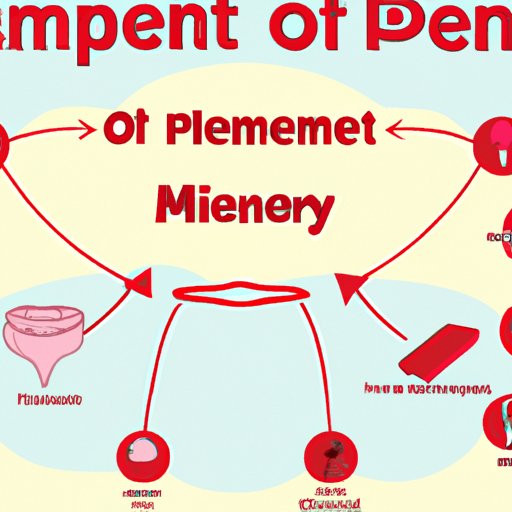Introduction: Explaining What is a Period Science
Period science is an area of study that seeks to understand the biological and psychological aspects of menstruation. It involves a range of topics from understanding the physiology of the menstrual cycle to exploring the effects of stress on menstruation. By studying period science, we can gain insight into how the female body works during this time and how to best manage any symptoms or challenges that may arise.
Defining the Menstrual Cycle
The menstrual cycle is the process by which the female reproductive system prepares for pregnancy and then sheds the lining of the uterus if no pregnancy occurs. This cycle typically takes place over 28 days and is divided into two phases: the follicular phase and the luteal phase. During the follicular phase, estrogen levels increase as the body prepares for ovulation. During the luteal phase, progesterone levels increase as the body prepares for a potential pregnancy. If pregnancy does not occur, the uterine lining is shed and the cycle begins again.

Overview of the Physiological and Psychological Effects of Menstruation
Menstruation can cause a wide range of physical and emotional changes. Physically, the most common symptoms are abdominal cramps, bloating, headaches, and fatigue. Emotionally, women may experience mood swings, irritability, and depression. Additionally, some women report feeling more sensitive to stimuli such as sound or light. The intensity of these symptoms varies from woman to woman and can be affected by lifestyle factors such as diet, exercise, and stress.
Exploring the Science Behind the Menstrual Cycle
The science behind the menstrual cycle is complex, but it is possible to gain insight into how it works and the effects it has on a woman’s body. To understand the science of the menstrual cycle, it is important to explore the role of hormones in regulating the menstrual cycle and the link between menstrual cycles and reproductive health.
Role of Hormones in Regulating the Menstrual Cycle
Hormones play a key role in regulating the menstrual cycle. Estrogen and progesterone are two of the primary hormones involved in the cycle. Estrogen is responsible for stimulating the growth of the endometrium, the inner lining of the uterus, while progesterone helps prepare the uterus for implantation in case of fertilization. Additionally, other hormones such as gonadotropin-releasing hormone (GnRH) and luteinizing hormone (LH) also play a role in regulating the cycle.
Link Between Menstrual Cycles and Reproductive Health
The menstrual cycle is closely linked to reproductive health. Regular, healthy cycles are an important indicator of overall reproductive health and are essential for conception and successful pregnancy. Irregular cycles can be indicative of underlying conditions such as polycystic ovary syndrome (PCOS) or endometriosis, both of which can affect fertility. Additionally, irregular cycles can also be caused by lifestyle factors such as stress, diet, and exercise.

A Comprehensive Guide to the Science of the Menstrual Period
To gain a better understanding of the science behind the menstrual cycle, it is important to investigate the physical and mental changes that occur during the cycle. Additionally, it is important to examine common menstrual symptoms and their causes. Finally, it is important to understand the physiological and psychological effects of menstruation.

Investigating the Physical and Mental Changes During the Menstrual Cycle
During the menstrual cycle, a woman’s body goes through a number of physical and mental changes. Physically, the most common symptoms are abdominal cramps, bloating, headaches, and fatigue. Additionally, some women may experience nausea, breast tenderness, and back pain. Mentally, women may experience mood swings, irritability, and depression.
Examining Common Menstrual Symptoms
Common menstrual symptoms can vary from woman to woman and can be caused by a variety of factors. For example, cramping is often caused by the release of prostaglandins, a type of hormone that causes the uterus to contract. Bloating is often caused by an increase in progesterone, which can cause fluid retention. Headaches and fatigue can be caused by fluctuating hormone levels and a lack of sleep. Additionally, stress can exacerbate existing symptoms.

Understanding the Physiological and Psychological Effects of Menstruation
It is important to understand the physiological and psychological effects of menstruation in order to properly manage any symptoms or challenges that may arise. The role of hormones in regulating the menstrual cycle is essential to understanding the effects of menstruation. Additionally, investigating the link between menstrual cycles and reproductive health can provide valuable insight into how to maintain optimal reproductive health.
The Role of Stress on Menstrual Cycles
Stress can have a significant impact on menstrual cycles. Studies have found that high levels of stress can lead to irregular cycles and can even cause amenorrhea, the absence of menstrual periods. Additionally, stress can worsen existing symptoms such as cramping, headaches, and fatigue. Therefore, it is important to find ways to manage stress during menstruation.
Examining the Impact of Stress on Menstrual Cycles
In order to manage stress during menstruation, it is important to first understand the impact of stress on menstrual cycles. According to a study conducted by the University of Michigan, chronic stress can disrupt normal hormone production and interfere with the body’s ability to regulate the menstrual cycle. Additionally, the study found that stress can also increase the risk of developing conditions such as PCOS and endometriosis, both of which can affect fertility.

Investigating Ways to Manage Stress During Menstruation
Once the impact of stress on menstrual cycles is understood, it is important to investigate ways to manage stress during menstruation. Some effective strategies include regular exercise, relaxation techniques such as yoga and meditation, and getting adequate rest and sleep. Additionally, it is important to practice healthy eating habits and to avoid unhealthy behaviors such as smoking and excessive drinking.
Conclusion
In conclusion, period science is an important area of study that seeks to understand the biological and psychological aspects of menstruation. It involves a range of topics from understanding the physiology of the menstrual cycle to exploring the effects of stress on menstruation. By studying period science, we can gain insight into how the female body works during this time and how to best manage any symptoms or challenges that may arise.
The role of hormones in regulating the menstrual cycle is essential to understanding the effects of menstruation. Additionally, investigating the link between menstrual cycles and reproductive health can provide valuable insight into how to maintain optimal reproductive health. Furthermore, examining the impact of stress on menstrual cycles and investigating ways to manage stress during menstruation can help women manage their symptoms and maintain healthy menstrual cycles.
Overall, period science provides a comprehensive guide to understanding the science behind the menstrual cycle and its effects on the female body. By gaining insight into the physiological and psychological aspects of menstruation, women can make informed decisions about how to best manage their symptoms and maintain optimal reproductive health.
(Note: Is this article not meeting your expectations? Do you have knowledge or insights to share? Unlock new opportunities and expand your reach by joining our authors team. Click Registration to join us and share your expertise with our readers.)
